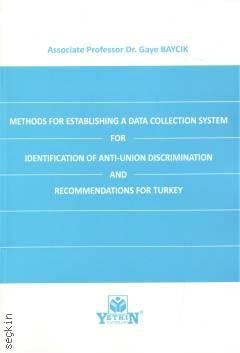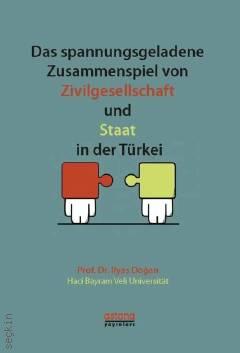>
Sosyal Bilimler Kitapları>
Siyaset Bilimi>
TürkiyeSivil Toplum Kuruluşları>
Methods for Establishing A Data Collection System for Identification of Anti–Union Discrimination and Recommendations for Turkey

Methods for Establishing A Data Collection System for Identification of Anti–Union Discrimination and Recommendations for Turkey
1. Baskı,
Ağustos 2023
Kitabın Detayları
Dili:
İngilizce
Ebat:
16x24
Sayfa Sayısı:
126
Kitabın Fiyatı:
200,00₺
Temin süresi 2-3 gündür.
Kitabın Açıklaması
The collective labour lavv system of our country has many problems that have been criticised for many years and one of the diatribe is the lack of method of collecting data for anti-union discrimination. Therefore, it is decided to examine some EU countries' implementations and data collection methods in order to come to recommendations for our country.
In the preparation of this study, first, the data collection systems developed to produce measures d to control and prevent anti-union discrimination in the European Union countries and to make these measures more aligned with facts of the country and ensure their effectiveness were researched. AH European Union countries were subject to research; hovvever, no countries were identified to produce statistics on anti-union discrimination except for Finland. Same applied to Eurostat and ILOStat databases. Therefore, in preparation of this study, data collection methods and databases on the violation of prohibition of discrimination which are used in European Union countries and followed by Eurostat which constantly undertakes works to develop them were reviewed.
During the preparation stage of this study, existing data collection systems and databases vvereuated to find out to vvhat extent they could be used to create a database on anti-union discrimination and to this end, recommendations vvere devised on the usability of existing databases for creating a database on anti-union discrimination. Moreover, in addition to existing data collection systems, d amendments in our legislationpractice wereuated and direction of these amendments and in vvhich areas in our country they should be made in order to create a database on anti-union discrimination were designed.
Kitapla İlgili Kategoriler
Kitabın Fiyatı:
200,00₺
Temin süresi 2-3 gündür.
Hakkımızda
|
Uluslararası Yayınevi Belgesi|
Kaynakça Dosyası|
Kişisel Verilerin Korunması |
Üyelik|
Siparişlerim|
İade Politikası|
İletişim


